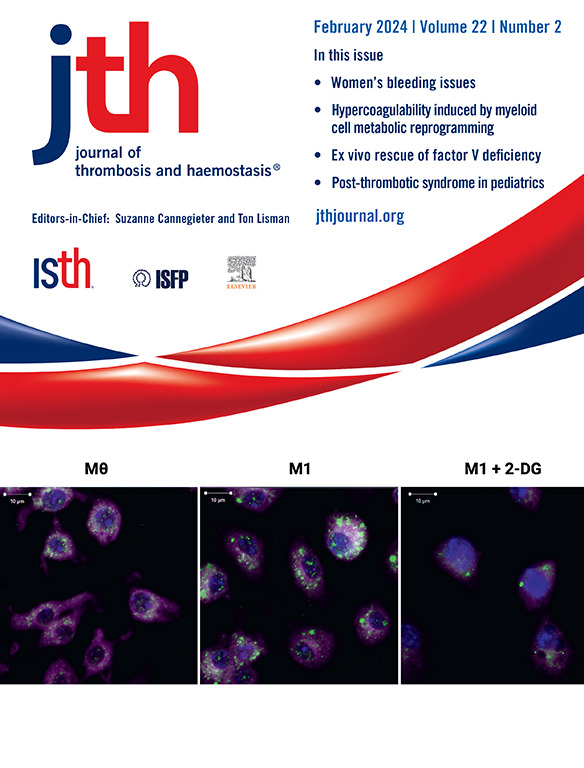Successful use of aflibercept for high cardiac output in hereditary hemorrhagic telangiectasia after failure of pazopanib and bevacizumab therapy
IF 5
2区 医学
Q1 HEMATOLOGY
引用次数: 0
Abstract
Hereditary hemorrhagic telangiectasia (HHT) can manifest with hepatic arteriovenous malformations, leading to a high cardiac output state and pulmonary hypertension. Bevacizumab is commonly used to treat this complication, but response is often partial and may diminish over time. We present a patient with ACVRL1-related HHT and high cardiac output who failed pazopanib and developed apparent bevacizumab resistance with symptom recurrence despite maintenance and reintroduced therapy. Aflibercept, a vascular endothelial growth factor and placental growth factor-binding decoy receptor, was initiated intravenously, resulting in improved dyspnea, decreased epistaxis severity, and a reduction in cardiac index from 3.92 to 2.90 L/min/m2. Hemoglobin and iron indices remained stable without transfusion or iron support. This case highlights aflibercept as a potential alternative antiangiogenic agent for HHT-related high-output states following bevacizumab failure. Mechanistic distinctions between these agents and prior reports of aflibercept efficacy in other refractory vascular contexts suggest a role for broader investigation.
帕唑帕尼和贝伐单抗治疗失败后遗传性出血性毛细血管扩张患者的高心输出量成功应用阿非利西普。
遗传性出血性毛细血管扩张症(HHT)可表现为肝动静脉畸形,导致高心输出量状态和肺动脉高压。贝伐单抗通常用于治疗这种并发症,但反应往往是部分的,并可能随着时间的推移而减弱。我们报告了一名acvr_1相关HHT和高心排血量患者,他在帕唑帕尼治疗失败后出现了明显的贝伐单抗耐药性,尽管维持和重新引入治疗,但症状复发。静脉注射Aflibercept(一种血管内皮生长因子和胎盘生长因子结合诱变受体)后,呼吸困难得到改善,鼻出血严重程度降低,心脏指数从3.92 L/min/m2降至2.90 L/min/m2。血红蛋白和铁指标保持稳定,无需输注或铁支持。该病例强调了阿非利西普作为贝伐单抗失败后hht相关高输出状态的潜在替代抗血管生成药物。这些药物之间的机制差异和先前关于阿布西普在其他难治性血管环境中的疗效的报道表明,需要进行更广泛的研究。
本文章由计算机程序翻译,如有差异,请以英文原文为准。
求助全文
约1分钟内获得全文
求助全文
来源期刊
CiteScore
24.30
自引率
3.80%
发文量
321
审稿时长
1 months
期刊介绍:
The Journal of Thrombosis and Haemostasis (JTH) serves as the official journal of the International Society on Thrombosis and Haemostasis. It is dedicated to advancing science related to thrombosis, bleeding disorders, and vascular biology through the dissemination and exchange of information and ideas within the global research community.
Types of Publications:
The journal publishes a variety of content, including:
Original research reports
State-of-the-art reviews
Brief reports
Case reports
Invited commentaries on publications in the Journal
Forum articles
Correspondence
Announcements
Scope of Contributions:
Editors invite contributions from both fundamental and clinical domains. These include:
Basic manuscripts on blood coagulation and fibrinolysis
Studies on proteins and reactions related to thrombosis and haemostasis
Research on blood platelets and their interactions with other biological systems, such as the vessel wall, blood cells, and invading organisms
Clinical manuscripts covering various topics including venous thrombosis, arterial disease, hemophilia, bleeding disorders, and platelet diseases
Clinical manuscripts may encompass etiology, diagnostics, prognosis, prevention, and treatment strategies.

 求助内容:
求助内容: 应助结果提醒方式:
应助结果提醒方式:


